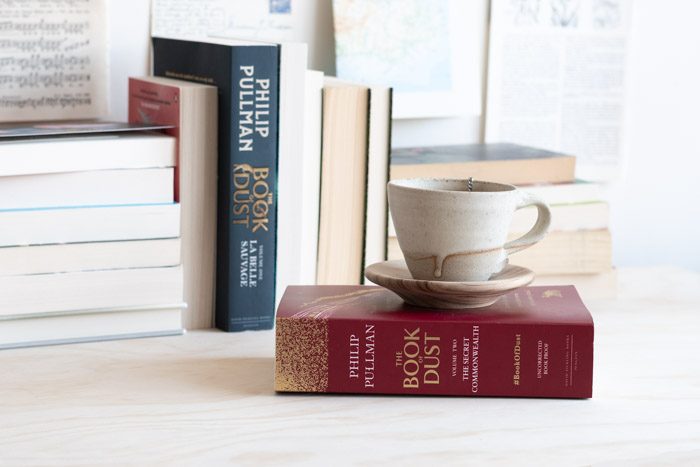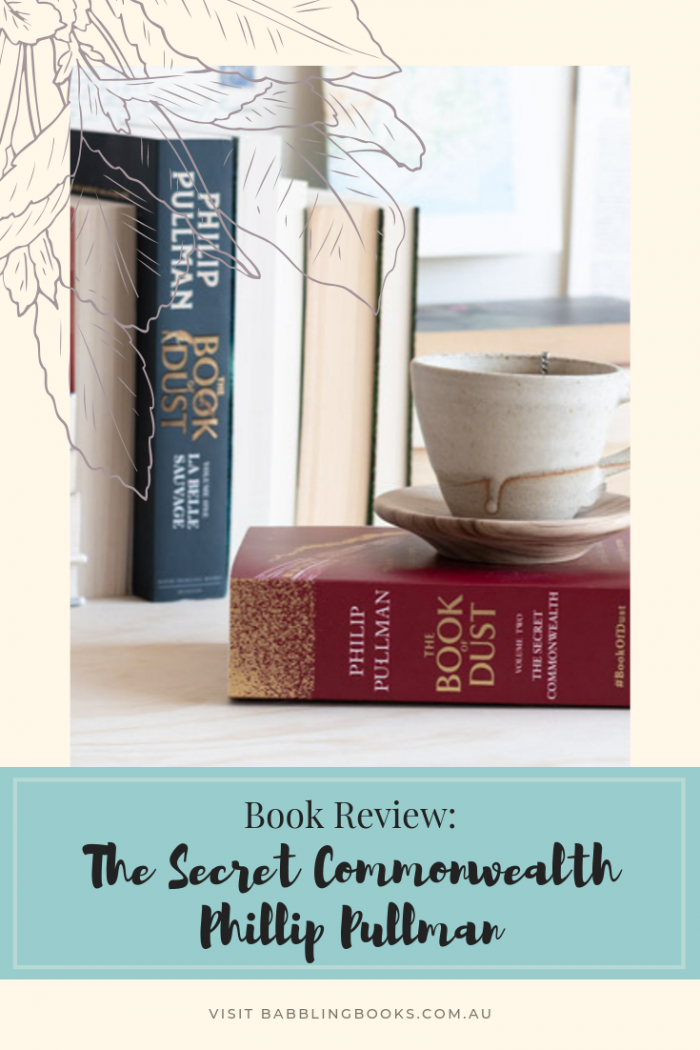The fantasy series on everyone’s lips in 2019 is The Book of Dust, and I’m delighted to share a guest review of the latest installment – The Secret Commonwealth. The Book of Dust explores events that took place both before and after the the iconic His Dark Materials series. There was huge excitement when volume one, La Belle Sauvage was released in 2017. You can read Kerry’s guest review of volume one here.
Note, this review of The Secret Commonwealth may contain details of earlier books in the series, including His Dark Materials and La Belle Sauvage.

Guest review of The Secret Commonwealth
My rating: 3 out of 5 stars
Reintroducing a much-loved childhood character post their glory days is a daunting task which requires a delicate hand. With past achievements looming in the backdrop and formative in-between years available only in limited glimpses as the author sees fit, this kind of endeavour risks dividing the original audience. I can’t recall any other series which has attempted such a feat apart from Harry Potter, and everyone knows how that turned out.
In The Secret Commonwealth, Philip Pullman restores a glimmer of hope that it is possible to revisit old, beloved characters successfully. After traveling back in time to when Lyra was a baby in the first instalment of The Book of Dust, the narrative is turned on its heel and propelled forward almost a decade after the events of His Dark Materials. Now a young woman, Lyra has grown out of her wild, impulsive and headstrong ways. A turn of events at her home in Jordan College reconnects her with Malcolm, now Dr Polstead, and past actions come quickly flooding back to haunt the both of them.
From Oxford spirals a journey spanning continents, secret agencies and the many faces of that marvellously Machiavellian administration, the Magesterium. Switch out the frozen setting of Svalbard for the dusty deserts of the Middle East, throw in a new, big corporation bad guy, sprinkle on some shocking revelations about the human-dæmon relationship, and I am thoroughly looking forward to the third course. Pullman is truly a gifted story teller, and this really shines when he explores the dæmon bond and other such creative aspects of his world. There is a bit of an armoured bear-sized gap in my heart, and I wish he dove deeper into these fantasy elements as he does the political side. His characterisation of Lyra as a woman was mostly believable; in fact, he probably oversold this at times. I related to her struggle at becoming lost in a world of skeptics and critics, and losing grip on the creative side which fuelled your imagination as a child. The plot maintains a steady pace, and though it does stretch on and repeat itself occasionally – a tougher editor might have shaved off 100 pages – it’s compelling enough to bear these minor bumps.
While I generally adore Pullman’s writing, there were several comments throughout which made me feel uncomfortable. In a section addressing why dæmons usually exist as the opposite gender of their human, I felt there was a huge missed opportunity to expand past heteronormative culture, and there was also a derogatory observation about a sex worker by a character (yes, this might not be Pullman’s personal stance, but it was unnecessary). There were two other major incidents which concerned me: one comes with a trigger warning of sexual assault, and I’m conflicted over whether I’m being too sensitive about this being included in the story or not; and the other concerns a potential and very unbelievable romantic relationship. I dearly hope the latter turns out to just be a red herring which is subsequently quashed, as it really put a bad taste in my mouth regarding that particular character and could stand to ruin the finale.
Much like its middle predecessor The Subtle Knife, The Secret Commonwealth bears the full weight of being a ‘set-up’ novel charged with preparing everything for the climax. Lacking its own neat sub-story arc to tie off, an abrupt and ambiguous ending unfortunately provides little satisfaction after a near 700 page slog. I’m also left wondering, was La Belle Sauvage necessary? A lot of the events from during the flood are readdressed, which may have been sufficient to inform the reader alone, or they could possibly have been condensed to a novella similar to Lyra’s Oxford (which, now that I mention it, you should definitely read before this). Don’t get me wrong, I would love if all authors wrote sprawling side and back stories to accompany major plots, but I would just hate it if the third and final book suffered because it’s over-stuffed with information that could have been spread out more effectively.
On a positive closing side-note, can I just say how obsessed I am with the stunning artwork by Christopher Wormell? It’s so warm and inviting and magical – I could honestly stare at this cover all day, which is lovely because there’ll probably be a good 2-3 years to do so before we get wind of any conclusion!

Kerry is a raging bibliophile from Melbourne, Australia. When she’s not reading she loves hanging out with her dog and eating vegan snacks. If you enjoyed Kerry’s review of The Secret Commonwealth, check out her page on Goodreads!
Pin for later…

